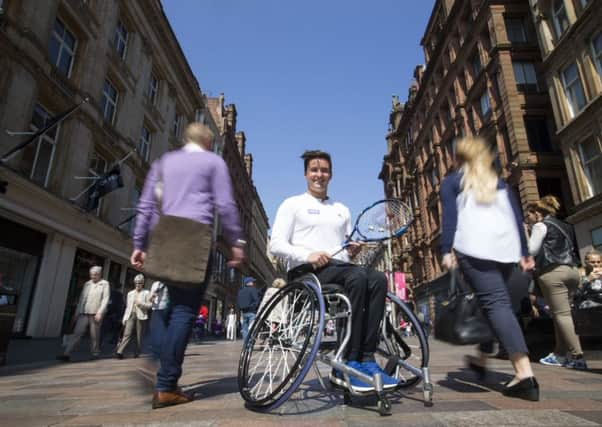Disabled Scots athlete Gordon Reid in sponsorship plea


Four years after the BBC screened the paralympics from London on its mainstream channels Gordon Reid says he is “one of the lucky few” to have secured a deal.
The wheelchair tennis star says despite taking part in the same tours as Andy Murray and Roger Federer, disabled players are regarded as “second class”.
Advertisement
Hide AdAdvertisement
Hide AdReid, who became Britain’s first wheelchair Grand Slam singles champion at the Australian Open in January, said: “We have to accept we are never going to gain the fame of the likes of Andy Murray.
“While we can win major titles through stubbornness and determination, few of us can win sponsorship. What we do is just not deemed exciting by some people.”
Gordon, 24, was paralysed from the waist down at the age of 12 as the result of a rare spinal condition, transverse myelitis. He loved sport and took up wheelchair tennis. He has become one of the best in the world.
Now, preparing for a tournament in Japan, before playing in France and then Wimbledon, he says gaining sponsorship from Glasgow-based McCrea Financial Services, will change his life especially as he trains for the Rio games later this year.
He said: “It will mean having a bigger team around me to help with the training and support and means I can drive myself even harder.
“I was lucky to get lottery and government funding but signing this deal takes me up a level. I am one of the few in the world to get this, and that is a shame. I’m hoping the popularity of disabled sports helps change this.”
He broke into tears last week when watching the Invictus Games in the US when he heard one of the athletes – all disabled former servicemen and women – talk about their struggle.
Reid, who endured three years of rehabilitation to learn to walk a few steps, said: “This guy had gone through so much and was so upbeat and determined. He was inspirational. You think ‘How can he possibly do that?’ but when you saw him in action you did not think of his disability, just how damn good he was.
Advertisement
Hide AdAdvertisement
Hide Ad“Disabled athletes have such different backgrounds. Everyone has their own unique story of what happened to them and what they have had to go through.
“So it is great more and more people are able to hearing about disabled athletes’ stories I hope, as more people start following disabled sports, more people will be able to find sponsors.”